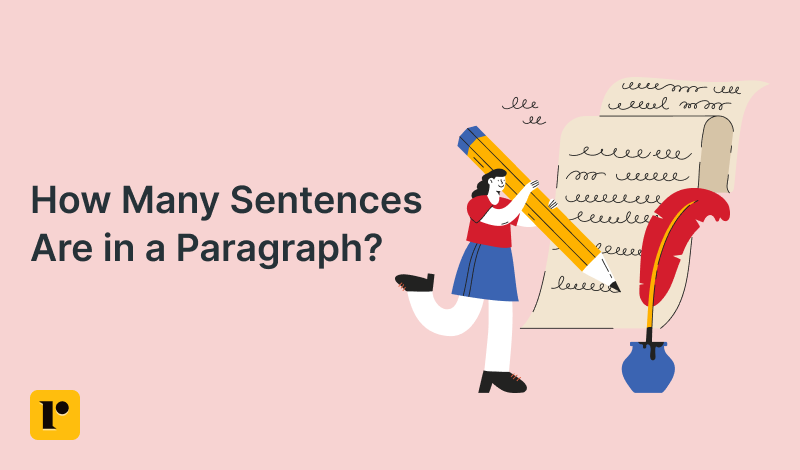
What’s the ideal number of sentences in a paragraph? At some point, almost every student and writer has this question in their mind. Some think a paragraph must have three to five sentences. Others argue that it depends on the idea. So, what’s the ultimate length of a paragraph?
Today, we will briefly answer this question. So, let’s dive in straight away!
There are mainly three factors that determine the length or number of sentences in a paragraph. They include;
First, think about the purpose of your content. If one sentence paragraph serves the purpose, it’s enough. On the other hand, if it demands multiple sentences, you should write them. For instance, in novels, writers often use short paragraphs to keep readers hooked. Academic writers lean toward longer, detailed paragraphs to provide information to their readers. On the other hand, social media content creators craft short and snappy paragraphs to convey maximum information in minimum words.
Next, consider your audience. Who’s reading your work? Writing for online readers? Keep your paragraphs short. Creating detailed reports for industry experts? Go deeper. Think about their attention span and adjust paragraph length accordingly.
Finally, look at your content. What are you saying? A simple idea? A few sentences are enough. Writing a complex argument to prove your point? Write longer paragraphs containing as many sentences as required. Balance short vs. long sentences to enhance clarity and impact.
There is no fixed number regarding that. A paragraph can have one sentence. It’s rare, but sometimes, it’s quite effective. For instance, think of it as a punchline. It grabs attention and conveys the message.
But paragraphs have more than one sentence. Most writers prefer writing three to five sentences. This range keeps ideas clear and digestible.
Sometimes, paragraphs even stretch to eight or ten sentences. They are helpful when you are writing detailed explanations or reports. Remember, too many sentences are not ideal, as they distract readers.
In fiction, you can vary the number of sentences in a paragraph. For instance, write short paragraphs to build readers’ interest and provide a great reading experience. However, you can also write more paragraphs to build scenes perfectly.
Clarity is the most crucial thing in nonfiction. Therefore, you must craft paragraphs to ensure it. Use a type paragraph structure in nonfiction. Start your paragraph with a topic sentence. After that, provide supporting details. And at last, write concluding sentences.
In online content, readers scroll fast. They skim. Short paragraphs (two to four sentences) work best in online content. They are also easy to read and digest.
In professional communication, every word matters. Therefore, you must ensure clarity and brevity. So, your paragraphs must be short and direct. Don’t add fluff and write too many sentences in your paragraphs.
Every paragraph should have a purpose. Start a paragraph with a clear topic sentence that introduces the main idea and sets the tone. Then, build around this idea by adding details, examples, or evidence. After writing the entire paragraph, check if it feels right. If so, that's great. Otherwise, adjust it accordingly.
When writing multiple sentences in a paragraph, use transition words. They can hold ideas together and make your text engaging and understandable. The common transition words include, however, therfore, or, for instance, etc. Use them whenever they are required. But don’t overdo it.
Mix short, medium, and long sentences to create rhythm. Short sentences grab attention, and long sentences add depth. Together, they keep the reader engaged. Vary sentence length to avoid monotony and provide a remarkable reading experience. If you've extended a sentence for clarity but now wish to shorten it, a sentence shortener can help.
Remember the “one idea, one paragraph” rule. Don’t add too many ideas in a single paragraph. If one sentence covers the idea, don’t add more sentences to it. Similarly, if an idea requires up to ten sentences, write them to cover your idea.
No matter what, always ruthlessly proofread and edit your paragraphs to make them more impactful. While proofreading and editing, don’t just rectify grammar and contextual errors; cut unnecessary and repetitive words and phrases.
So, how many sentences are in a paragraph? It depends on you, your reader, and your purpose. There’s no magic number. But there is a magic balance. Find the right balance, and your writing will shine.